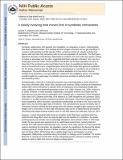A SLOWLY EVOLVING HOST MOVES FIRST IN SYMBIOTIC INTERACTIONS
Author(s)
Damore, James A.; Gore, Jeff
DownloadGore_A slowly.pdf (1.291Mb)
OPEN_ACCESS_POLICY
Open Access Policy
Creative Commons Attribution-Noncommercial-Share Alike
Terms of use
Metadata
Show full item recordAbstract
Symbiotic relationships, both parasitic and mutualistic, are ubiquitous in nature. Understanding how these symbioses evolve, from bacteria and their phages to humans and our gut microflora, is crucial in understanding how life operates. Often, symbioses consist of a slowly evolving host species with each host only interacting with its own subpopulation of symbionts. The Red Queen hypothesis describes coevolutionary relationships as constant arms races with each species rushing to evolve an advantage over the other, suggesting that faster evolution is favored. Here, we use a simple game theoretic model of host–symbiont coevolution that includes population structure to show that if the symbionts evolve much faster than the host, the equilibrium distribution is the same as it would be if it were a sequential game where the host moves first against its symbionts. For the slowly evolving host, this will prove to be advantageous in mutualisms and a handicap in antagonisms. The result follows from rapid symbiont adaptation to its host and is robust to changes in the parameters, even generalizing to continuous and multiplayer games. Our findings provide insight into a wide range of symbiotic phenomena and help to unify the field of coevolutionary theory.
Date issued
2011-04Department
Massachusetts Institute of Technology. Department of PhysicsJournal
Evolution
Publisher
Wiley Blackwell
Citation
Damore, James A., and Jeff Gore. “A SLOWLY EVOLVING HOST MOVES FIRST IN SYMBIOTIC INTERACTIONS.” Evolution 65, no. 8 (August 2011): 2391–2398.
Version: Author's final manuscript
ISSN
00143820
1558-5646